#the morality attributed to both light and darkness can be seen as flawed
Explore tagged Tumblr posts
Text
i wont lie i am the type of man to look at art of sora n riku and immediately go 'wheres kairiiiiiiiiii'
#like. i wont say i dont understand why she gets so little spotlight. but You Know#like even in kh1 (the only one ive finished thus far lols) i think her interactions w the other kids r intersting!!#like juxtaposing her trying to leave riku behind vs his utter devotion to bringing her back#bcos In A Way she DOES get what she wants and she n sora are together and riku is alone. albeit in a very 'kairis inside me' way#and like obvi shes like 14 so to call her Morally Gray would be laughable at best#but i DO like that arguably one of the only character choices she makes ('hey sora lets take the raft and leave just the two of us')#is a dick move!#like u could argue even before you get to com Riku Has To Accept His Darkness And Its Not All Bad stuff#the morality attributed to both light and darkness can be seen as flawed#because of how 'dark' riku is loyal and faithful in a way that 'princess of light' kairi straight up is not#or at least doesnt reciprocate#and like man its probably meant to be read as romance stuff but that literally did not occur to me until now#where was i taking this. i dont remember#anyway i was gonna go play com but i think i might rewatch a kairi kh1 cutscene comp first#not like itll take long
1 note
·
View note
Text
Meta: Luminaries and Power in MDZS
Apparently I’m doing meta for the Untamed Winterfest “star” prompt (day 14) because I keep thinking about “rising stars” and “falling stars” and supernovas and the sun and guiding stars, which makes me think a lot (a lot a lot) about Wei Wuxian, and the Wens, and Jin Guangyao, and Lan Wangji.
Like, we have the Wens here, right?

And the Wens are basically the cautionary tale for the whole rest of the plot. “Do Not Covet Power” the story tells us over, and over and over, “Power Will Turn Against You,” but the Wens come (chronologically) first. They wear the sun, and the phoenix. They stand triumphant, the brightest star in the sky, and they start thinking that means they are the sun, the source from which all other power flows, the unkillable generator of life. And so the sun turns scorching—there are too many suns in the sky, shoot them down or all life will burn—and the rest of the world snuffs them out, one by one (until one single sun is left, excuse me while I cry over A-Yuan; okay, we’re good).
Pretty blatant, in-your-face cautionary tale for a whole generation, right? Maybe even two generations? “Hey, look, those people over there, they tried to gather up all the power and they died horribly, maybe we should not do that.” Except none of them learn anything. Anything. They still all think it’s about who’s right, completely ignoring the fact that they’re all operating under a “might makes right” mentality, the lot of them (Especially Jin Guangshaun, of course).

Wei Wuxian starts out as a rising star—the child who came from nothing, but he has so much talent and he shines so bright that no one can ignore him. Even when they hate him, they can’t look away. (He’s also pretty much the only cultivator who regularly talks to the everyday people of the world as if they’re equals, but that’s a whole other thing.) He freely gives power away when he gives Jiang Cheng his golden core. It doesn’t define him, it’s just a tool, which has been very useful but which he can do without.
Honestly, I think if Wen Chao hadn’t found him and dropped him in the Burial Mounds he would have found something else to do. He’d likely stay with Jiang Cheng (who would have to know about him not having a core, once he found Wei Wuxian basically half-dead in that town, I don’t think Wei Wuxian was originally planning to hide that part once it was finished), and still be part of the Jiang sect and consult on tactics and do work that you don’t have to be a cultivator to do (which is a lot, really). He’d still have all the competent-gentleman-skills: archery, riding, calligraphy, etiquette and math, as well as all the general knowledge he’s collected from a truly rarefied education. He can’t use a cultivator’s sword, and he’ll never attain immortality, but there are plenty of other cultivators whose sword skills and quest for a longer lifespan are suspect. Maybe he’d still go on night hunts. Maybe he’d write excellent training manuals or mentor Jiang-sect kids. Maybe he’d make lots of talismans and just wave that in everyone’s faces, idk, it’s really hard to say how talismans work in this universe. Point is, I think he would’ve made things work in a less drastic way than what he ended up with, because at the time the power didn’t matter to him.
But instead Wen Chao does find him and does drop him into the Burial Mound, and whatever happens there (I really, really want to know what happens there), he comes out of it with TOO MUCH power. Power no one has ever seen before. It’s the only way he can survive there. He hoards power for good reasons, for his own survival and (later) to ensure the survival of others, but he is absolutely biting off more than he can actually deal with, and it immediately starts fucking up his life. He’s a supernova in the making. That bottomless source of power not based on his own physical limits + the Tiger Seal + his apparently endless well of traumatic life events means that he is absolutely going to collapse in on himself at some point. He loses reputation, and standing, and then people. He is almost universally reviled, with multiple actions both correctly and falsely attributed to his name. He knows it’s happening—Who can tell me what I’m supposed to do now?—he’s lost every reason he had for hoarding the power in the first place, he’s having uncontrolled explosions of power where thousands of people die, and so he tries to give the power back by destroying the seal so no one can have that power, but power doesn’t work that way: it has to go somewhere, and it goes through him in an event that people are still talking about over a decade later.
And yet. Does anyone learn anything? “Hey, that seal seems like a super dangerous tool there, maybe it should … not be used ever again? Be destroyed? It made that guy incredibly unstable and then he exploded over the whole cultivation world, maybe we should… not?”
No, of course not. (Aside from Lan Wangji, the Nie sect and Wei Wuxian. Lan Wangji seems to have developed this knowledge early. Wei Wuxian learns the lesson; it goes hand-in-hand with his (novel) daydreams of leaving the life of a cultivator to be a farmer with Lan Wangji. I think Nie Mingjue knew it too, because the Nie sect has some themes going on with the damage power can do, but he didn’t get a chance to talk about it much. Nie Huaisang, in addition to Nie sect things, is very observant and doesn’t have strong ambition at all until he starts getting fucked with, so he has less to figure out on this front.)
Everyone else still thinks it was about the Wens, and “corruption” and that Wei Wuxian was just wrong, even though they were the ones you know… killing children and elderly people in a culture that supposedly values both quite highly. Power is just power, right? Nothing wrong with power, in fact, maybe we should expand that power even more, with a centralized system of control. Supervisor posts? No, no, these are watchtowers. They’re for your benefit too, I promise. Also blackmail, lets use lots of blackmail and some really deep dungeons, but it’s totally okay because it’s us doing it, right.

Jin Guanyao is Hou Yi, the archer who shot down the sun (that link again), and rose to become an imperial tyrant—whose cruelty led his wife to abandon him (I’ve read multiple versions of Hou Yi, but this one fits here) and cut short his quest for immortality. His whole life is about gathering power, and justifiably so given how aware he is of the precarious nature of his position for most of it. Anytime someone feels like it, they can cut him down with a single reference to his mother. It doesn’t matter what his talents are, or how clever or well-spoken he is. Everything he’s built up for himself can be taken away in an instant, because he’s the son of a prostitute and that means he doesn’t matter. This is not to say that he doesn’t deserve Nie Mingjue’s reprisal or Nie Huaisang’s revenge, of course. He absolutely does horrific, terrible things every step of the way, and for entirely selfish reasons. But he’s Wie Wuxian’s closest foil: here’s what happens when someone of merit, rather than bloodline, seeks power: they’re creative, and innovative, and oh boy are they going to shake the world. This is what happens when cruelty and manipulation take the place of love and affection in a child’s life: each perpetuates itself on a larger scale—I will kill even those closest to me vs. I will die to protect a stranger. This is how the quest for power plays out when the motivation is selfishness, rather than selflessness. In the end, both are inherently flawed, because the power itself is the root of the problem.
Unlike Wei Wuxian, Jin Guanyao holds onto his power until the very last second. Literally, any scrap, even just Lan Xichen’s affection for him. His fall is fast, and guttering—so fast that it’s over before most of the world even knows it’s started. He’s a meteorite, his origins worse than obscure, growing ever brighter in the sky until he crashes to earth, leaving devastation in his wake. And I mean that literally, the power-structure of the world is shattered by the dual events of his exposure and his death. It’s so completely broken that in their rush to consolidate power once more, the person all these leaders turn to is Lan Wangji, who just happens to be the most reputable guy still standing at the end.
So, let’s look at Hanguang-jun, the Light-Bearer.
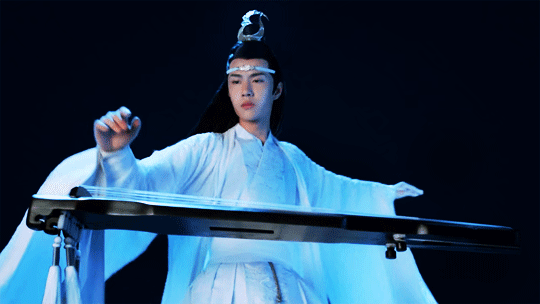
Lan Wangji is the lodestar. He’s a constant that rarely, if ever, wavers in his convictions, and for the purpose of the plot he’s effectively the example of what an “ideal” cultivator should be (I know other people have written about LWJ and the Confucian ideal, especially @rustycol so I’m not going far into that here). He’s arguably the most successful character in the canon. He has both bloodline and merit working in his favor, and he’s pretty much the most respected cultivator in the world by the time he’s 35 (ages in this canon are a mess). He can disobey or even betray his clan and not be uprooted, which is a luxury literally no one else has (yes, he’s punished, yes, there are consequences, but he attacked 33 elders and didn’t get kicked out or killed! He’s still respected and part of the clan! Don’t tell me that’s not because he’s the clan leader’s bloodline—there are a lot of things that can be said about LWJ and his clan and morality but they’re for yet another post).
The protagonist thinks highly of him. The next generation looks up to him, pretty much universally. He is respected even by people who don’t like him, and has almost zero actual enemies (Su She isn’t even a luminary in this meta analogy, Su She is a dude with a lantern trying to blame the stars for the fact that he can’t fly). Lan Wangji is the guiding light that goes into dark places where chaos reigns and brings clarity, and calm, and (often unforgiving) justice. He doesn’t seek power, and he doesn’t hoard it. In the novel, the only prize he takes away from Jin Guanyao’s fall is the certain knowledge of Wei Wuxian’s love. He doesn’t want anything else, and that’s why he gets to walk off into the sunset with the love of his life and keep his peerless reputation, even in a culture as steeped in homophobia as the novel’s world. Obviously the drama has a different ending, but I think the point still stands: Lan Wangji is so well-respected and utterly reliable that I doubt anyone even thinks twice about offering him the position of Chief Cultivator. Who else could they choose, shocked and appalled as they are in Jun Guanyao’s wake, but the star that never moves no matter how the heavens turn?
It’s been a rough 15 years. Between Lan Wangji, Nie Huaisang and that last Wen child, maybe they’ll finally get that lesson about hoarding power to stick in a few more people’s minds. We can only hope.
#untamed winter fest#mo dao zu shi#the untamed#mdzs meta#the untamed meta#wei wuxian#lan wangji#jin guangyao#long post#theres more about the nie sect#but i dont have a star ready#so#next time#alex writes
272 notes
·
View notes
Text
My Thoughts on the Potential Personality of a Certain Pharaoh We Never Met
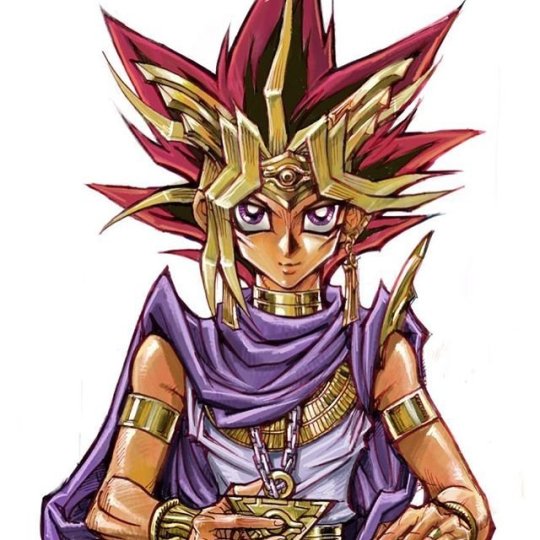
Hey guys...It’s been a while since I wrote something about YGO specifically and well since that is the main focus of this blog, I thought I’d create another discussion.
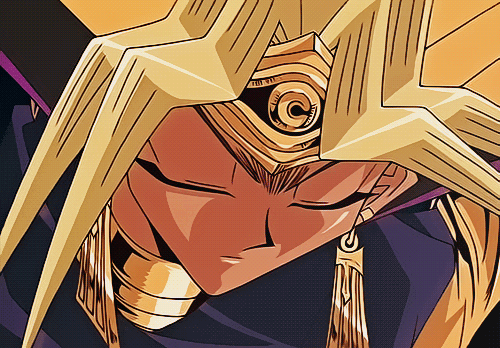
This particular tidbit (more like a brain fart to be completely honest) is from scrolling through this website and other social media pages and therefore stumbling on the fandom making their theories and headcanons on what Atem’s true personality is. I think we have all seen the jokes on how we as a fandom like to write him off as this super gay, suave, smooth talking, prideful king. The counter argument I often see is that he is socially awkward, fumbling serial killer, with an identity crisis. All of these claims tend to be backed up by people recalling numerous amounts of the original source material from Mr. Takahashi, but sometimes I wonder what could have been.

Popular headcanons asides (that means we are not using any ships and/or made up assumptions with no basis), let’s talk about this for a minute. What has Kazuki provided and what can we assume about Atem’s actual character. Despite being a 200+ episode anime, several movies, and over 30 volumes of manga, our favorite author has left a lot to be desired from this guy. Once we’ve discussed the material, I’ll make a personal evaluation of what Atem could have been like had we been able to meet him after he had retrieved all his memories.
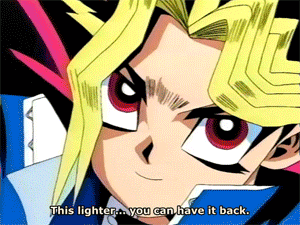
Okay so perhaps the fandom is right about one thing, Atem started out as a borderline serial killer. Well, according to the manga, he has got quite a bit of red on his ledger with multiple violent injuries/deaths by his hands.
Right at the moment Atem’s spirit was reawakened by Yugi completing the Millennium Puzzle, we have an individual very determined to protect his vessel at any cost. Of course not without his own enjoyment in participating in his “Dark Games”. So we can tell Atem is very protective of Yugi, his group of friends, and generally any other innocent bystanders. We can argue he is a little over protective via his deadly methods but I guess it’s the thought that counts right?

Luckily for Atem’s victims, he stops his magically mind-fucking bullshit after the Duelist Kingdom arc. He never explains why he stops. Perhaps it has to do with his development as a character to not be as ruthless in an attempt to comfort Yugi.
One attribute Atem does not lose throughout the series is when confronted with any sort of enemy, we see Atem is very confident in his abilities. Another thing the fandom got right is well... he is quite the smooth talker. Despite being from a completely different era, this guy always knows what to say to enemies and rivals alike. Not to mention his motivational speeches to his friends are always quite powerful. If anything I would almost consider Atem a bit of a life coach. He more or less helped raise Yugi and company into the individuals they become.
Along with giving everyone their moments of support, Atem does a pretty good job blending in with modern society despite being locked up in his own head for thousands of years. I find some individuals, thinking Atem is a complete fumbling socially awkward dork and well, maybe not so much. Sure he has his moments, I think we can all look back on the ‘Date’ episode, but we have to look at which version we are watching/reading. For the sake of accuracy I tend to interpret the Japanese material as it is closest to the manga. As I said, Atem isn’t perfect, he can be very blunt to people when they ask him for an opinion (or telling people it’s the end of the world if he doesn’t win a card game), but I certainly wouldn’t consider him completely ‘socially awkward’ in general.
But honestly that can be a whole other essay and I’m just talking about basic character traits overall. Now let us discuss some of Atem’s flaws.
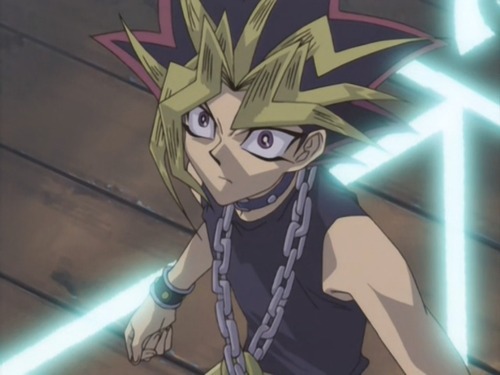
So to make things easier, let us list the flaws as they appeared in both manga and anime:
When Shadi was first introduced to us (manga), we got a glimpse of seeing our favorite dark spirit sweat in the heat of a shadow game. It was revealed that Atem knew little of his true identity and sharing a Yugi’s body meant, that the two would share each others emotions. Moreover, this spirit had fears and doubts just like the rest of us.
As time passes we see more of Atem’s doubts emerge as he becomes more comfortable with Yugi and company, and therefore he expresses his confusion about his past. Where did he come from and who is he and such. This guy needs to have a sense of purpose and being Yugi’s guardian is fine, but at the end of the day, it would be best for him to become his own person.
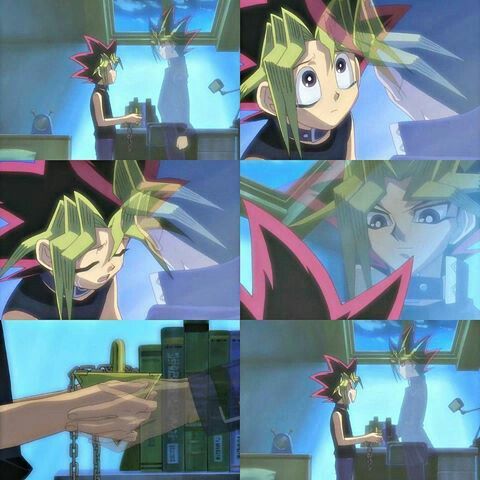
There is another interaction in the manga (and in the Japanese version of the anime) that I found interesting. When Atem addresses this identity issue and whether his time on this plain is limited, Yugi kind pushes it off as something he doesn’t want to think about. The kid does it again (god I can’t remember exactly which arc this is, I wanna say DOMA), Atem mentions the issue and Yugi says “You can have my memories”.
For fans of the pairing (to be honest I’m a boring canon-ish shipper so not my cup of tea, but I get it...this scene is pretty gay) this moment is viewed as tender love and care but I can’t help but notice a pattern and another character flaw. We have a guy with no memories of his own and having an identity crisis but every time he wants to discuss this issue, his best friend tends to push it away. I understand Yugi’s reasoning, that Atem is basically the catalyst for all the good things to happen in his life, but the constant ignoring of the problem for the first half of the series is borderline toxic. Furthermore, it shows Atem is a bit of an enabler when it comes to Yugi. Unlike Joey who loudly addresses the behavior to Atem’s face, Yugi finds comfort in it and for both of them it only makes the journey harder for them in moments of separation.
Just something I thought I’d bring up since I don’t see a lot of people talking about moments of toxicity in this friendship. Not that it is a bad thing, I find it quite interesting and realistic. Not all relationships with people are perfect.
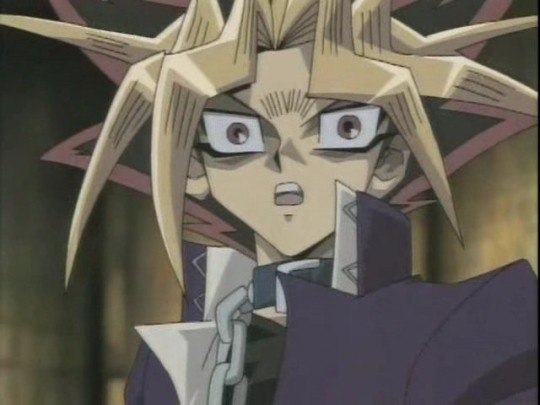
Last by certainly not least, Atem’s biggest character flaw, is he is one prideful son of a bitch. Yes, I said it. He likes to complain a lot about his rival (Kaiba) about the characteristic when he is also guilty of it. It’s always duelist pride this and duelist pride that, when a lot of the times this bullshit is what almost gets people killed. Atem’s pride kind of ties in with the ruthlessness of his character, where in the ride to victory he sometimes forgets the people he defeats are still humans beings. Take the incident with Arkana, it took Yugi switching back to keep the guy from getting his legs cut off. (Move out the way Jigsaw, Atem is gunning for your spot.)
But his pride works against him when individuals such as Yami Bakura and Dartz use their words to question his morality. What would Atem do just to obtain victory? While our hero tends to grow from these experiences and beat the bad guys in the end, it does not negate the fact that the pharaoh’s greatest strength also tends to be his greatest weakness.

Okay so I’ve gotten most of Atem’s characteristics down pat before he retrieves his memories. In summary here is a list of some of his qualities I’ve gathered from the source material.
PROS
-protective & caring nature
-generally is confident in his abilities
-good with his words, knowing when to pick someone up and put his enemies down
-Adapts to modern customs and his friends pretty well, especially for someone locked up in a pendant for so long
-easily takes a leadership role (probably a projection of his kingship past) although he is often humble about his status as pharaoh
-his pride keeps his head held high and rises above all challenges
CONS
-let’s be real the guy is incredibly blunt (this could be a pro or con depending on preference)
-can be an enabler to Yugi at times
-ruthless nature (let’s be real his kill count is like 5+ people in the manga, probably more)
-has an overall identity crisis
-tends to put others above himself, which at times can be toxic or detrimental to his character
-his own pride can be used against him, placing fear and doubt into his mind (DOMA was a great example of this)
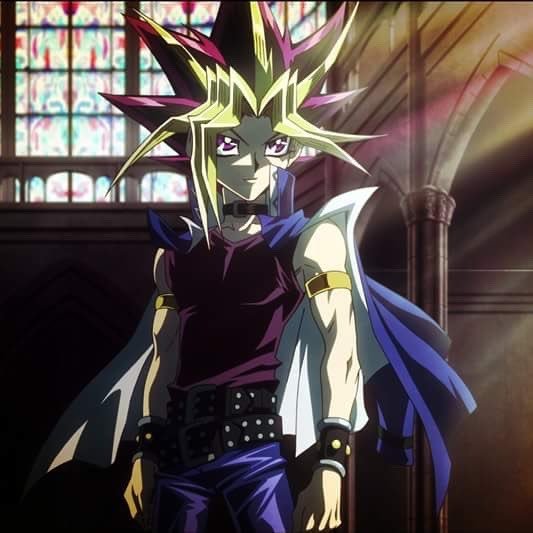
I feel like every time Takahashi draws him in a new movie, he just adds more flair and muscles (not that I’m complaining)
So now we come to a head and the big question is what are we missing out on? Perhaps one of the reasons Yu-Gi-Oh DM has so much fanfiction and forums about it is the general sense of emptiness the ending of the series left behind. I think dub Tea put it best, (these are not the exact words, I’ve already spent an hour writing this) Atem was leaving us just as we were getting to know him. Finally a season where we get to see him as his own character, and honestly him fighting bad guys and dying for it, was not the way a lot of us would have wanted to see him go. Instead he comes back to duel Yugi but Atem feels so stiff and mysterious. The guy doesn’t even talk to the poor girl crying in front of him. This isn’t a guy who just wanted to up and leave from the get go. But now that he got the information he wanted, suddenly he just says fuck it and gives a thumbs up walking into the light? Nah. I’m sorry to say the Yu-Gi-Oh is not on my top list of anime endings, but it can be one of saddest.
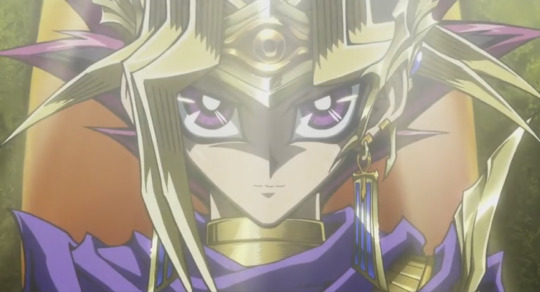
I often wonder time and time again, what would have Atem been like around his friends. Maybe he would have more of a sense of humor (like he was with Mana). Would he have more wisdom? Would he be more charming? These are just a few question I and many others have about our favorite pharaoh. But hey that’s what we have headcanons for right?
Now some of you may be wondering, especially as a fanfic writer, what are my own headcanons about Atem? As I mentioned before I guess you can say I’m boring, I prefer canon-ish ships and I try to keep my headcanons as much in line with the source material as I can. Of course I add a tad of my own flair to it so it isn’t completely the same. If anything I try to fix so of the errors I see in the original.
My headcanon for Atem (post memories): A lot of the qualities I mentioned before would most likely remain the same, if not positively amplified. He certainly wouldn’t be as ruthless as he used to be, the anime/manga has shown his growth from that. He would definitely still be very protective of those he cared about. Although I can’t help but think that after remembering his past, he would carry himself in a regal manner. Possibly even without him noticing because he was raised from birth to become a king. Considering the strong connection with his father, I can see the guy having a keen sense for family bonding, perhaps even wanting one of his own. It is traditional for pharaoh to want to pass on their legacy. I’m also sure we all like to think the guy would be incredibly charming, considering how he always seems to know exactly what to say. Although he would still be blunt with his statements, he isn’t one to lie or hold back. If you ask Atem a question you will get the truth and the honest truth. Pride and honesty are incredibly important to him. While he respects honesty, I can imagine he would like to keep personal matters to himself and not worry others. If anything he would rather stay quiet than create a lie. Lastly considering how humble he tends to be with the people around him and how he values everyone as equals, I can see Atem being very open-minded to try new things and explore various ideologies. He would not judge, or have prejudice. He would be accepting and encourage others to be who they are as long as they were good people.
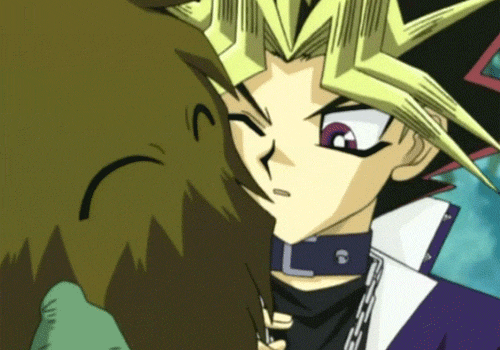
Okay so maybe he would be low-key nervous around pets lol.
Well, that was longer than I planned it to be, but thanks for reading all that if you did. Feel free to add to the conversation or blow up my inbox!
#Yu-Gi-Oh#yugioh#Atem#pharaoh atem#my thoughts#headcanon#my favorite pharaoh#feel free to inbox me#yami yugi
84 notes
·
View notes
Text
Why Bojack Horseman season 5 was disappointing
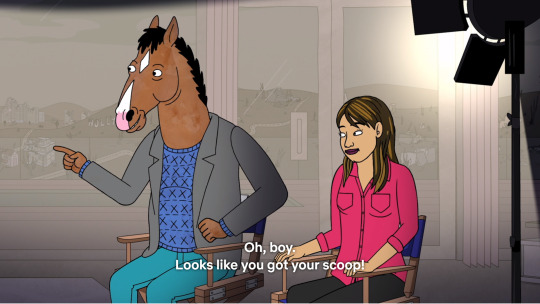
So it ends with a car slowly disappearing into a tunnel. The driver is probably just as confused about her motives as I am in that moment. The music plays, the camera zooms out, the credits roll, the curtain falls. And here I am, feeling more conflicted than I’ve ever felt before about a piece of media.
By now it’s well known what kind of heights the Netflix show Bojack Horseman can sore to when it’s in its element. This show is truly something special. I’ve never seen anything that can touch me, delight me and, at the same time, depress me the way this show can. Catch me at the right time and you might even hear me confess to this being my favourite show of all time. So rest assured that everything I’m about to say I say out of love, and because of the incredibly high standards the show has set for itself. That being said, I do think my complaints are legitimate, and there were enough serious shortcomings to make me feel very disappointed in season 5.
According to many, Bojack Horseman had kind of a rocky start. Looking back at the first few episodes I think they are decent enough, but they’re certainly not representative of what the show would become known for eventually. But we didn’t have to wait very long to see a drastic increase in quality, which kept on going until the season 3 finale brought it to a preliminary climax. I still think season 3 is the strongest one overall, though the highest highs probably occurred in season 4. And then there’s season 5, which is the first time I feel the quality has dropped significantly. Worse, it detracts from previous seasons by putting certain moments in a new, quite unflattering light. But we’ll get there.
Themes of Ruin
The first thing I have to talk about, and I just have to get this out of the way so please bear with me, is feminism and my intense dislike for it. A lot of people when they hear this still think that I feel this way because I have a problem with women’s rights. Nothing could be further from the truth though. If feminism was just a women’s rights movement I’d have no problem with it. But it is way, way more than that. Feminism is an ideology, that brings its own ideological lens to the table. When viewed through that lens the world turns into one where society is dominated by an all encompassing power structure called the patriarchy. Men and women are related and locked together by a massive class struggle, although some more modern strands of feminism hold that men are just as much puppets of the patriarchy. The patriarchy, then, is the source of all the world’s social ills, and puts upon us a moral obligation to overthrow it in some kind of world revolution. Worse still, feminism in recent decades has become more and more anti-science in an attempt to discredit scientific explanations for social ills that they attribute to the patriarchy. It’s gotten to a point where the whole concept of the scientific method is under attack from academics who bought into this world view. I’ve written about this before, if anyone’s interested. All of this makes it impossible for me to view feminism as anything but a nutty conspiracy theory, akin to the kinds of things the alt-right movement would say about Zionism.
So to make the character of Diane Nguyen a feminist was always going to result in an uphill battle to make me lik her. Again, if this confuses you: imagine if she’d been a white supremacist instead, or some other kind of ideologue which would be completely disgusting to you. Imagine if instead of going on about the patriarchy, she went on about the conspiracy to commit genocide against white people, organised by a shadowy group of Zionists. That’s what it feels like for me. No matter how sympathetic the rest of her character is, her spouting that bigoted nonsense from time to time was always going to be a mark against her. And yet, amazingly, for four seasons the writers did make me like her, quite a bit actually. She was shown to be a caring, principled person who held herself to very high standards. While she had her flaws, she also seemed acutely aware of them. So much so that her season 2 arc revolved entirely around her hiding away from one of her failures out of shame. This season however her dark side just can’t be ignored anymore, because it’s intrinsically woven into the entire theme of the season. And the Diane that it brings out is one that the show is trying to frame as an improved version of herself, but honestly she just seems like kind of a bitch to me. But I’ll get back to Diane’s character this season in a moment. First I want to start with some of the more minor annoyances.
The Road to Nowhere
Throughout season 5 of Bojack Horseman I continually felt like I was waiting for something to happen, like the show was promising me something but dragging its heels to get there. I think the main reason for that is that nothing this season really got resolved, and some promising plot lines were barely explored. I know a lack of resolution is kind of Bojack Horseman’s thing. Life doesn’t suddenly end with a credit roll; it just keeps going even after what you think is a happy ending. The creator of the show, Raphael Bob-Waksberg, has stated that he doesn’t believe in endings. A bit of a worrying statement, since Bojack does have to end one day, but it has worked so far. Here’s the thing though: Bojack Horseman is not real life; it is a tv show. As such it needs to keep to a certain structure to tell an effective story. If you want to show something resembling real life that’s fine, but do cut out the dull bits please. We get an entire arc of Princess Carolyn looking for an adoptive child which seemingly gets resolved at the end by.... her adopting a child. Maybe it’s just me, but that feels way more like the beginning of a story than any kind of resolution. We get some interesting backstory about PC during her search, but the whole things ends up feeling like padding. Certainly nothing that compares to her arc in season 4, where we see her go from heaven to hell in the span of several episodes.
Bojack himself this season doesn’t seem to go through any kind of character growth either. There are no moments of revelation that give him and us more insight into his tortured soul. Everything we see of him we knew already, and all the problems he faces are ones that get introduced right at the beginning of the season, to be seemingly resolved at the end. Again, I will get to the ludicrous season climax in a moment, but as for the main character of the show: it seemed like the writers were either disinterested in him or really had no clue where to go with him next. Bojack kind of disappears into the background altogether during much of the season, since most of the other characters get way more development than he does. We do get some interesting interactions between him and Hollyhock, but that doesn’t really go anywhere either.
Mister Peanutbutter’s arc is actually kind of interesting and I have no major complaints about that. Todd on the other hand is probably one of the biggest missed opportunities in the show so far. His asexuality, and the problems coming with that, are barely explored. When Todd first came out as asexual I was a little disappointed I have to admit. I saw Todd as someone who was just really shy about sex, even though he had a healthy social life in most other respects. I saw a lot of myself and my own complicated relationship with my sexuality in Todd because of that, more so because there just aren’t any characters in fiction which represent that side of me. So when that turned out to be wishful thinking on my part, for a moment it was quite a letdown. But hey, the show doesn’t have any obligation to cater to me specifically, and it’s true that I’ve never seen an asexual character either so this could be quite interesting after all! Or so I thought.
In reality the issues surrounding asexuality barely get a mention. I don’t know any asexual people, so I can only go on what I’ve heard. My understanding is that most asexual people are indeed interested in romance, but finding someone who will be there for them, with which to form an emotional bond and a life partnership, but who at the same time is okay with never having sex with them, is quite hard. In fact, it’s something that a lot of asexual people really struggle with. I was a little disappointed that none of that really came into play in season 4, but it seemed season 5 was going to remedy this. As it turned out we get only a few brief moments where its mentioned that asexuals shouldn’t date each other just on the basis of both being asexuals and that’s it.
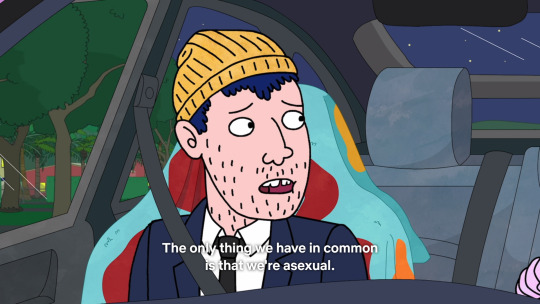
The rest of the time Todd doesn’t appear to be struggling with it. In fact, he doesn’t really seem to need any kind of genuine human connection at all. That’s fine for a comic relief character, which is how Todd spends most of his time, but if you’re going to tackle a serious subject like this then don’t half-ass it. Hell, Emily seems to struggle with it a lot more than Todd, even though we have seen that Todd does have feelings for Emily. All of the above is mentioned at one point or another, but we never see the consequences play out the way we usually do on this show. More time is spend on the social stigma surrounding asexuality than it is on actually living with it. Maybe season 6 will finally go deeper into the nitty gritty, but if so it remains just another thing that this season sets up only to do nothing with.
Diane
As the final episode of season 5 ends we focus on Diane driving a car. It’s a departure from previous seasons where we would focus on Bojack in the final moments, but it’s a fitting one since season 5 was much more Diane’s story than it was Bojack’s. It’s also a departure in another way, namely that I have no fucking clue what I’m supposed to feel while watching this, nor what’s supposed to be going through the head of the person I’m watching. Diane is probably the most prominent victim of this season’s smothering theme. Normally a theme should strengthen the material by binding everything together in a package that’s greater than the sum of its parts. But as previously mentioned this season has a strong feminist bend, and one of the stated goals of feminism is to make the personal political. As such, everything having to do with it is swallowed by the political message it’s trying to get across. At least, that’s what it seems like. With Diane we start out observing a woman who is trying to cope with her recent divorce. This was the obvious angle to take of course after season 4, and certainly one with a lot of potential. I really felt for Diane as she had to struggle with her newfound poverty, both in her love life as well as her, well, actual life. In episode 4, titled BoJack the Feminist, it all comes to a head for the first time however, beginning with the following stupid line:
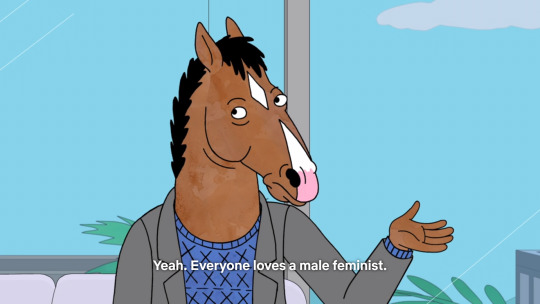
Who? Who loves male feminists? As far as I can tell they’re one of the most despised groups of people populating the political landscape. Obviously anti-feminists loathe them, often even more so than their female counterparts. But judging by the portrayal of every man claiming to be a feminist in this show I doubt even the person who wrote that line holds them in very high regard. I would think that someone trying to write political satire would at least have to be grounded enough to know something like this. During this scene we are also subjected to the following tired cliche:

One would think that by now everyone knows this simply isn’t the case. It’s not like feminists have never tried to broaden their appeal by finding a man to speak for them. As it turns out this never works. Because the world in which a man’s word is taken so much more seriously that it’s the only way to get a message into the public consciousness, that world exists only in the heads of the most devout feminists. The only way to still be clinging to this notion is by completely ignoring reality. As it happens that’s exactly how it goes, and time and again I have to sit through another incarnation of a feminists “brilliant” “new” idea of: “hey, what if we let a man say it?!” I’m sure every time this happens the person in question thinks they’re the first to come up with it and thinks themselves very smart indeed. I don’t know how they respond when it fails yet again, but I doubt we’ll see any introspection on it from the writing staff in season 6.
In any case, this episode was probably the most annoyingly feminist one out there. We get the conformation that Diane also buys into the behavioural psychology side of the ideology, with her whole “media normalising the wrong things” shtick. It’s quite a worrying thing to me that the writers themselves seem to buy into this as well. There is a fine line between weaving a message in your art and making soulless political propaganda. If you care more about the message your art gets across than the quality of the art itself, as Diane appears to do, then it becomes damn near impossible to stay on the right side of that line. Last season there were some signs of this already, when we got the amazingly ridiculous Thoughts and Prayers. It made some interesting points about women and gun ownership (an argument straight from the NRA as it turns out) but ends in a spectacularly ridiculous fashion.
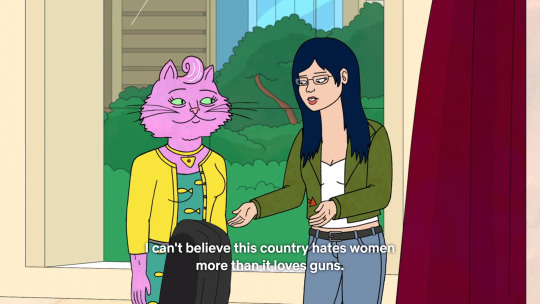
This after the Californian state legislature just passed a ban on all guns after a woman committing a mass shooting, described by PC as “sensible gun legislation” after a whole episode of arguing why gun ownership might be a positive thing for society in some cases. I can’t believe the Bojack writers are that cynical about the motives of gun ownership advocates. I really don’t know what they hope to achieve by knocking down such a clumsily constructed strawman either. In any case, besides the obvious bullshit conclusion the episode itself wasn’t that offensive to me, unlike BoJack the Feminist which wears its biases on its sleef.
The next big development in Diane the soapbox straddler’s journey comes in episode 7 called INT. SUB, where we get this bit from ms. Nguyen:
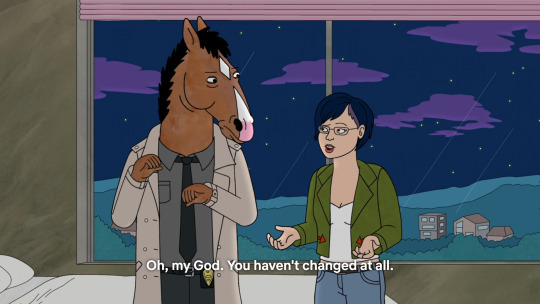
Admittedly Bojack spends most of this episode being a huge dick, so a verbal slap down was probably the appropriate response here. One might be tempted to brush off this comment as Diane just being angry, and rightfully so. But the way it’s framed it comes across like Diane is supposed to be speaking some hard hitting truth. She’s not though. We’ve been with Bojack for 44 episodes by this point and the changes have been so gradual they’re sometimes hardly noticeable, but they’ve been there. Bojack went from someone who did nothing but keep Todd down to being genuinely supportive of him when he admitted to being asexual. Yes, there was this one episode where he almost helped Todd launch a music career, but I always interpreted that as him trying to impress Diane. He went from someone who would turn down everything he got offered for the flimsiest of reasons to doing a show he knew nothing about as a favour to PC.

He went from someone who cared about no one but himself and his own misery to someone who genuinely cares about the well being of Gina, his costar. He went from someone who pushed everyone away to someone longing for the company of his sister, who he clearly cares about very much. Can you imagine the arsehole of early season 1 doing any of that? So Diane’s comment appears very misplaced and mean-spirited. With some different framing this whole situation could be about unfairly judging someone’s past. Of course we know the show is definitely not going to go there; it railed against forgiving public figures, that is men, for past transgressions just three episodes ago. Anyway, the point is that I can understand Diane saying it in the heat of the moment, but why does it seem like the writers are agreeing with her?
Here we come back to the crux of Diane’s arc in this season. The reason she inflicts her feminist side on us so much is not because it’s in service of any kind of character development. Her arc should've been about her standing on her own two feet again after the divorce, like it seemed to be at the beginning. Instead somewhere along the line the writers decided to make her the mouthpiece of the message this season is trying to send, thus making her character subordinate to political considerations, just as I feared. This is expressed most clearly in episode number 10, Head in the Clouds. Bojack and company are at the premier of their television show Philbert when Bojack is asked to say some words to the waiting public before the screening. Since he has nothing prepared and his head is at a totally different place at the moment he mutters some lines which barely make any sense.

They are enough to set off Diane’s righteous fury however and after the screening she first confronts Flip, saying that she “screwed up”.

The idea is that she thinks because people will identify with Philbert they will rationalise their own awful behaviour. So what we learn here is that Ms. Nguyen, despite her lecturing about media and how it influences people, doesn’t actually understand the first thing about how art interacts with the human mind. The big problem with most human beings is that they tend to overestimate their own goodness. This is not my observation, in fact it’s widely known among folks who study this sort of thing. The best way art can shape us into better people is not by being purely didactic, that is, trying to teach us what’s good and what’s bad. People above the age of nine are not going to absorb that message. Instead, what a piece of media should aim to do is try and help the observer become aware of the darkness in their own soul. The best way to do this is to make them identify with a character like Philbert, make them feel what he feels and then show them the shitty things he does because of it. And everyone feels vulnerable at some points. Everyone, even the biggest arseholes. So when you show someone like Philbert doing something nasty, and the viewer is seriously questioning whether or not they’d be doing the same thing in that circumstance, then you’ve written something successful. Then you’ve written something that can truly affect people for the better.
Of course all of this is completely lost on Diane who, after getting nowhere with Flip, goes to Bojack and confronts him with his earlier statement. She tells him that the point of Philbert was never to make him or anyone else feel okay about what they’ve done. She says she doesn’t want anyone to justify their shitty behaviour because of the show. Naturally Bojack asks her what the hell her problem is, so after some back and forth she confronts him with the tape describing what happened between him and Penny in New Mexico. The situation escalates until Diane starts berating him about what happened with Sarah Lynn. The fight ends with the apparent end of their friendship.
I hate everything about this whole scene. It fact it might be the whole reason I decided to write this. It’s downright uncomfortable to watch at some points. That probably was the intention to some degree, but it’s uncomfortable for all the wrong reasons. I don’t feel “confronted” by anything. Rather I weep for what the writers have done to Diane. This scene feel’s like a bully kicking their victim while they’re down. I’ll talk about the whole Penny and Sarah Lynn thing in the next part, so let me just say here that I don’t understand what Diane is hoping to accomplish with this. She asks Bojack if he feels bad about all the things he’s done, and he admits he does. He does try to excuse it.
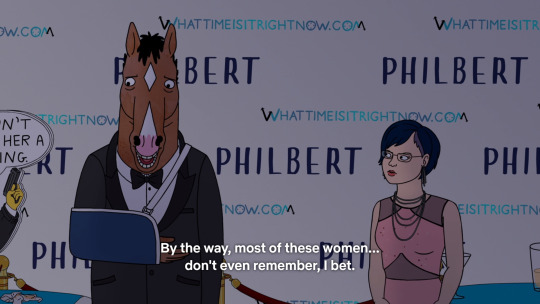
But after receiving no sympathy he goes on to claim that he is the real victim, because he has to live with this shit. Whether or not he really means it or is just trying to upset Diane is unclear. What is clear that Diane’s approach is entirely unproductive. Bojack becomes more and more defensive as she becomes more aggressive and unsympathetic. I would also like to know who all these women are that Bojack has wronged. It’s implied that Bojack doesn’t care about their feelings as long as he feels sorry for himself. Diane’s scrutiny isn’t exactly not making him feel sorry for himself, in fact it has kind of the opposite effect, but it’s also hard to sympathise when I don’t give a shit either. Who are all these women? What has Bojack done to them that was so horrible? Again, we’ll get to Penny and Sarah Lynn in a second, but I almost get the feeling that the show is trying to shame Bojack for having lots of casual sex. You can say that’s not exactly a good thing, but it’s not something that he does to other people. Sex, believe it or not, is still something that two people do together under most circumstances. I’m not going to feel sorry for all those vapid starfuckers for getting exactly what they were after. Even in the case of, say, Emily I don’t think he owes her any apologies. He certainly did to Todd for sleeping with the girl he was infatuated with, but then I don’t remember Todd being particularly upset at any of those firemen either. Emily could’ve just said no and that would’ve been the end of it. Instead she decided to approach Bojack and sleep with him.
The fight culminates in Bojack confirming her earlier accusation.

Which we already know isn’t true. After all, what is the point of this whole damn tv series if we didn’t see Bojack change at any point. But the writers put these words into his mouth not because it is in line with the character development we’ve seen so far, but because is serves the message. This season is about confronting powerful men with their awful behaviour, so Diane has to become belligerent to Bojack to confront him, and Bojack needs to tell us she’s right for doing so because he’s learned nothing. Screw you if you’ve become invested in his growth as a character. You’re no different from those who get invested in Philbert and cheer for him, even though he’s awful. That’s what I mean when I say Diane’s just become a mouthpiece for the writers. This scene is to show that Bojack is one of those awful powerful men that needs to be confronted, and the fact that it’s Diane doing it, the same person responsible for making Philbert “too likeable” says something about what the writers think about their main character. One gets the distinct impression that the earlier quote from Diane about Philbert is exactly how they think about Bojack. Given that, who do you think the people who excuse their behaviour because of Philbert are supposed to represent? Why do you think this season is so concerned with teaching us about how media normalises things? What we are watching is the writers confessing to realising how many people like Bojack, and them being afraid their audience is too stupid not to idolise and emulate him. So it has to be more obvious that Bojack is the bad guy, and believe me: they will make it very obvious in the next episode.
But first to wrap up Diane’s... I guess we should call it her “arc”. After angrily leaving the premier with her ex-husband she tops off the night by sleeping with him, despite his new girlfriend. Two episodes later it happens again. During the whole process she explodes several times about how bad it makes her feel, which prompts Mister Peanutbutter to ask:

Which she shoots right back at him. His answer is clear: because he loves her. But we never get an answer from her, and frankly: I would like one. It completely baffles me why she would do this. If her arc would’ve been more about her divorce perhaps this could’ve been explained. But as is it’s a shocking piece of hypocrisy that never gets addressed.
She does mention being a hypocrite and not knowing what she’s doing later on, but naturally there’s someone on hand to excuse her, since she isn’t a man.
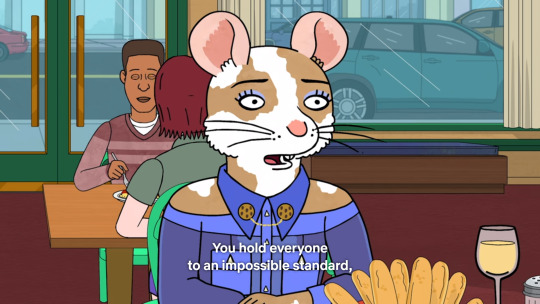

Here Diane shows some much needed introspection, but she doesn’t really go into any specifics. What’s more, the final conversation between Bojack and Diane doesn’t even reference any of this. In fact there is no reason given for why she’s helping him beyond a simple “eh, we’re still friends”

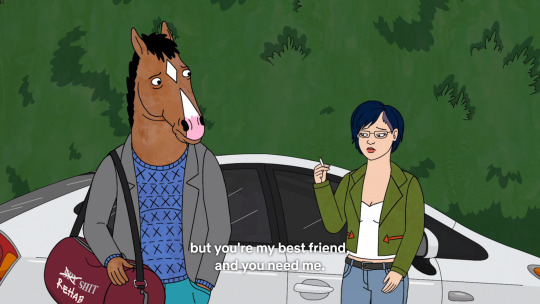
What she should’ve said of course is that she realised she can never expect to truly forgive herself if she can’t also forgive him. All the pieces were in place, and it would at least have given all the previous scenes I talked about some kind of point. The execution would still have been awful, but at least I wouldn’t have to use quotation marks around the word arc. But no, we can’t have the author insertion character come off her moral high horse, no pun intended. She just has to do it because she is such an awesome friend.
So yeah, bit of a mess this character. I can almost discern the contours of a logical character progression, probably as it was originally intended. All the ideas were there: her being confused about where she stands with Mister Peanutbutter, being confronted with her own insecurities at the same time, and Bojack trying to get her to play ball with his shitty schemes and her finally putting her foot down. But Bob-Waksberg has admitted that changes were made to the story after they decided to play into the #metoo controversy going on at the time. I wonder if those changes involved sacrificing some parts of Diane’s arc, to give us the mangled corpse of a character arc that we see here.
The Whole Penny and Sarah Lynn Thing
The two main things thrown at the feet of Bojack in the fight with Diane are his involvement in the death of Sarah Lynn and his almost having sex with the daughter of his old friend. Let’s start with the more justified one. What happened between him and Penny was that Bojack, a way older man who should’ve known better, gave in for a moment to the avances of a seventeen year old girl and might have done something with her if her mother hadn’t walked in. Now, I can fully understand why Charlotte would be very angry about this, and why Bojack feels guilty about it. After all, he found something out about himself which wasn’t pretty. But what I never understood was Penny’s reaction to all of this. Specifically the moment in what is probably one of the most profound episodes of the whole series, That’s Too Much, Man!, in which they go to her college and Bojack almost literally stumbles into her. Her reaction to this is... quite bizar. She acts like a traumatised child stumbling into her abuser.
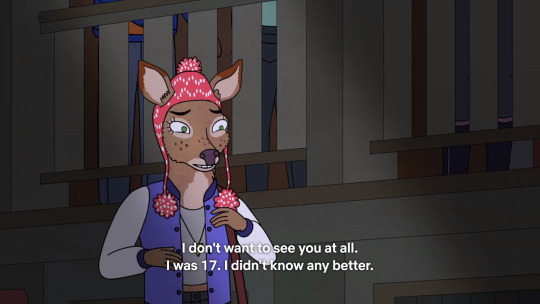
Keep in mind that this happened just last season. So how old is Penny now? Eighteen, maybe nineteen years old? No one says this about themselves just one year later. Never mind the fact that seventeen does not equal little child, I don’t buy that Penny had such a sudden leap in maturity. Maybe if it was ten years later and she had a lot more sexual experience, enough to know that sex can be a completely unromantic act to satisfy some urges sometimes. When she looks around and sees some seventeen year olds, and suddenly realises how young she was at the time, and then she realises she was taken advantage of and feels disgusted? Yeah, I’d buy that. But this is just nonsense. I thought so at the time as well, but I supposed it wouldn’t fit into the story line if we’d had to wait ten years for the revelation. What compounds it is this simple observation by Bojack himself.

And he’s right about that. Nothing actually happened. Sure, there were probably some exceptionally uncomfortable conversations between Penny and her parents afterwards, but I get the impression they worked it out between them. So at most I would expect Penny to look upon Bojack as a rather disgusting old man who she once, in a fit of youthful naïveté, felt attracted to. But this whole trauma angle stretches credulity. I was willing to put up with it as long as it was just another thing to weigh on Bojack’s conscience. The way he saw the incident up to this point was way more important than how it actually happened. After all, only he knows if he really would’ve gone through with it, or at least he thinks he knows. But now, because of the meta-commentary at work here, we as the audience are being scolded for not caring enough about Penny’s feelings by still rooting for Bojack. I’m sorry, but that’s where I draw te line. The reason I don’t care is because what you’re telling me makes no sense, and that’s not my fault.
On a side note: I do find it a bit rich that Diane essentially chastises Bojack for presumably intending to have sex with Penny, when in season one she was singing a rather different tune.
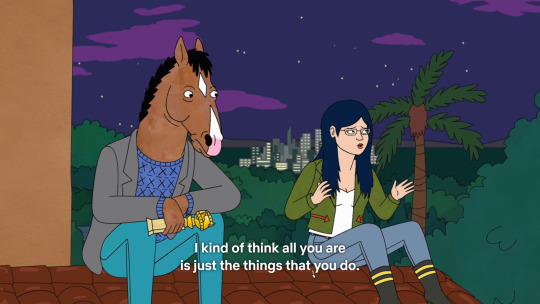
Whether you agree with that or not (I happen to think there’s a bit more to it than that) you have to acknowledge that it works both ways. Maybe Bojack is convinced deep down that he is capable of something like that, but until he actually does we’ll never know, and all we can judge him on are his actions. His actions don’t include sleeping with a seventeen year old girl. I wonder where the writers of season 5 stand on this, and if they realised this character inconsistency. Then again, I think we already established they didn’t really give a toss about Diane’s character this season.
Sarah Lynn then, the drug addict who overdosed on Bojack, thanks to Bojack. Or so we are led to believe. The truth of the matter is a lot more complicated I think. The only thing that Bojack bares the full responsibility for is him calling her up and asking if she’s up for going on a bender. Yes, that’s certainly not the most responsible thing to do, but she’d already revealed to Bojack she was fully intending on going back to doing drugs anyway. So let’s unpack the accusations regarding Sarah Lynn one by one.

So how was that his fault exactly? We see in one episode that her mother was right there on set with Sarah Lynn all the time. Sarah Lynn isn’t and never was his responsibility. The guilt he feels over that was more because of his inaction, which is understandable. Maybe he could’ve helped her, maybe not, but he probably should’ve tried. But when the only father figure in her life is an actor she works with then something has already gone terribly wrong, and not because of Bojack. The real reason it eats him up is probably because he cared about her and because he likes himself much more as a jovial dad than the grumpy washed-up celebrity he became, not because his actions led her to growing up the way she did.

When did that happen? Sarah Lynn never came to him for help. They accidentally ran into each other and after a little incident he immediately checked her into rehab. She refused to stay there though and came to Bojack to ask him if she could crash at his place. That’s the story, morning glory.

You could say it like that. Or you could say that she had sex with him. What’s the difference exactly? That Sarah Lynn was a washed up star, and addict who had a really rough childhood? All of that also applies to Bojack. Sarah Lynn wasn’t some wide eyed, innocent, naive, young thing. She was a grown woman in her thirties. Yeah, her and Bojack probably weren’t good for each other, but she came to him, remember? I can’t for the life of me think of a way of looking at this where Bojack was the one doing wrong to Sarah Lynn and not the other way around. Surely we aren’t supposed to think it’s because Bojack’s a man and Sarah Lynn a woman, right?

She seemed awfully eager to abandon her sober streak though. She lived in a house made of drugs with bottles stacked behind her calendar. Besides, as I said before, according to her she was planning on doing drugs again eventually.
But I get your point Diane. Maybe without Bojack this wouldn’t have happened. Maybe without Bojack she would still be alive. In any case it was pretty reckless of him to do that without any regards for her safety. So, where were her regards for his safety? Remember, he was an emotional wreck when he called her, and she didn’t give a damn. Under similar circumstances Bojack insisted she go to rehab, but she immediately agreed to take him on a bender and didn’t suggest to stop even when he started having severe blackouts. What if Bojack had died instead? Would Diane be giving this speech to Sarah Lynn now? Again, clearly these two weren’t good for each other, but I don’t see how Bojack was so much more responsible for this outcome than Sarah Lynn herself. How are “his actions” solely to blame for this? They were two damaged people doing stupid things together. Should he now feel guilty over having better luck than her?
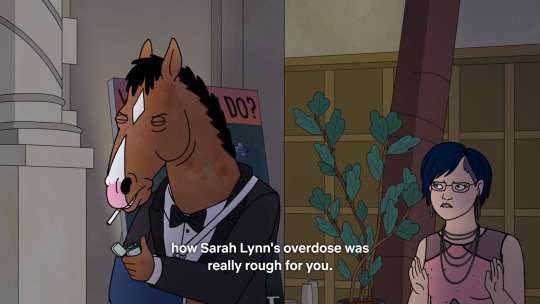
Well yeah, Diane. What are you, some kind of psychopath? Of course it was rough for him. He was there and could’ve stopped it, but he failed her and so his friend died. That would be very rough on anyone, and especially on someone who is already emotionally crippled. This is what I mean when I say Diane really comes across as a spiteful bitch in this scene. Can you imagine rubbing someone’s face in their friend’s death, even when you’re angry with them? I sure can’t.
In the end I think it’s a good thing for the show that Bojack isn’t actually as horrible as he believes himself to be, or as this scene is trying to imply for that matter. Bojack is an arsehole, sure. He does stupid things sometimes, he does things that hurt other people. But generally those people choose to associate with him, and we see the sometimes twisted, but relatable rationale behind his actions. It’s a good thing that Bojack retains a certain degree of likeability that keeps us rooting for him. If not I probably wouldn’t have watched the entire show up until now. These two incidents were the most shocking ones that happened before this scene, and although we’ve been told before that Bojack is not the good guy of the story, the writers clearly haven’t dared making him the bad guy either. In the end they know what they’ve got with him. Even the climax of this season, although probably even more shocking than anything that came before, they didn’t pull of without leaving lot’s of wiggle room to excuse Bojack. Here, let me show you.
Bojack’s Big Break
Bojack’s arc this season is almost none-existent as far as I can see. We find out literally nothing new about him, and I don’t know how he’s supposed to have changed by the end of it. Maybe it’s because I don’t follow the logic behind anything that happens between him and Diane at the end, but I never had that problem in previous seasons. There are two main developments. The first is Bojack starting to conflict the fictional world of the character he plays on Philbert with the real world and his own life in it. The second is his related drug addiction which begins around the start of the season and drives most of the plot surrounding him.
For starters I would like to say how strange it is to see Bojack develop a debilitating drug addiction. Not because he would never touch the stuff, but because he would, and has, many times before. In fact, he’s been an addict for years by now, and it never seemed to affect him the way these pills do. What’s so special about them? I don’t know. Granted, I’ve never taken them, but are they really that potent that Bojack would rather drown himself in those things than just drinking his pain away, as usual? I know a lot of people don’t realise this because of its pervasiveness, but alcohol is just another drug, same as cocaine, meth and xtc.
So that’s the first problem. The second problem is an out of universe one: it doesn’t tie into any previous character development. It resolves nothing, nor does it really further anything, except Bojack going to rehab at the end of the season. Maybe there we can see some character development, but it would then just be another thing that season 5 sets up only to do nothing with. Given that it doesn’t really affect anything until episode 11, the whole thing feels like an artificial substitute for a character arc. More like a contrivance for the sake of the big climax than something that flows naturally from the themes and character. Well, maybe that’s a bit unfair of me. It only really feels like a contrivance at the climax itself, and only in light of everything else I’ve discussed. In all honesty this plot line is actually woven pretty well throughout the events of season 5, and it does come into play a few times. We see it slowly escalate from the point where almost no one seems to notice to a the complete breakdown of Bojack’s sanity at the end. The problem, once again, is that it doesn’t develop Bojack as a character in any way. This becomes very clear in the big whammer episode when it culminates into a violent outburst on set between him and Gina.
So, the strangling incident then. There are two contradictory motivations at work here on the part of the writers. first, Bojack needs the be firmly reestablished as the bad guy in the story. It needs to be shown that he will just keep doing more and more horrendous things as long as he’s allowed to have a career despite of it and never learn his lesson. The point is hammered home when he strangles his costar on set in a fit of rage. To be sure, it’s the most shocking thing we’ve seen him do so far. Naturally it destroys his relationship with her and when they see each other again she is understandably wounded and furious do to his actions. But something doesn’t add up here and the writers hint at it without even knowing it.

Would he though? Admittedly I’m no lawyer, but I’m pretty sure there are some mitigating circumstances in this scenario. Leaving the legal technicalities aside for a moment, what does our intuitive sense of justice say?
It’s clear from the weird, trippy blurring of fiction and reality in episode 11, the fact that Bojack doesn’t remember anything of it afterwards and the clear implication that he isn’t being himself in the heat of it, that he’s having some kind of drug induced psychotic episode. Considering that he himself brought it on by taking way too many of those pills he’s certainly not blameless. But there was no way to predict this woud happen. Bojack’s never been violent before, as far as we’ve seen. He’s also done a lot of drugs, but it’s never triggered any kind of psychotic break. Not to mention that he got hooked on the pills due to a doctor’s prescription, not because he tried to get high. So at the very least there’s a bit of a moral grey area. In fact, I would say it completely undermines the moral picture this episode tries to paint. Bojack didn’t do this because he’s a bad guy. He did it because his mind wasn’t functioning properly due to outside influence. So the message falls flat. Of course it does: it conflicts with the writer’s other motivation, the reason a scenario where Bojack wasn’t himself for a moment had to be concocted in the first place. If they hadn’t it would’ve completely alienated the entire audience from the main character of their show. As we’ve established that was a bridge too far, so this weird compromise has been put on the screen where we are both supposed hate Bojack but excuse him at the same time. It doesn’t work because those are two contradictory aims.
Let me take a moment to point out how weird this whole conversation is. Gina implies that there’s been no justice for her. Yeah, but the reason there was no justice is because you haven’t pressed any charges, despite overwhelming evidence in your favour. You didn’t, because you cared more about your career than about justice. Now don’t get me wrong, I think the indictment of celebrity culture and the whole Hollywood publicity machine in this scene is actually very well done. But of all the things to get angry about, why bring this up? The one thing you yourself are responsible for. I mean, for crying out loud!
While we’re on the subject, am I the only one that finds it weird how she describes the incident?

He did a little more than that, didn’t he? Just physically overpowering someone is what you do when you want to restrain someone from getting away, or doing something you don’t want them to. In some cases it might be for their own good even. What Bojack did was lay on top of her and strangle her with both hands. If that happened to me I would never describe it in those terms. I don’t know what exactly the intent was with choosing these words. Maybe it’s supposed to show how reluctant she is to talk about it. But it comes across as either an attempt to trivialise the whole incident, or to place any instance of a man overpowering a woman on the same level as what Bojack did.
There is, admittedly, a more charitable reading of the climax, namely as an indictment against Diane’s behaviour in the previous episode. While the theme of the season is evil men and their evil deeds, it also shows there are no easy solutions. Directly after Diane’s confrontation at the premier Bojack is shown to take a large dose of pills to cope. It’s implied that his drug problem only really gets out of hand after that. So while Diane’s outburst might be justified, her moral grandstanding is not the solution to the problem. In fact it only made things worse. The final conversation might make slightly more sense in that light as well. Though only slightly, and it doesn’t exactly fix any of the other problems I’ve mentioned so far. Still, I suppose I should take what I can get. Which reminds me...
You’re Adopted!
Of all the many things that irked me about this season by far the most egregious one, the one that really made me angry, came right at the end. It was the rather underwhelming conclusion to PC’s arc. Her adopting a child and becoming a single mother in the process. What irked me wasn’t the underwhelming part, or that it didn’t fit into her character development, because it did. No, it was the huge blow to my respect for her, and the way in which it was framed. It’s made to look like this happy ending for both mother and child, but it’s quite possibly the most selfish thing I’ve seen anyone do in this show, which is saying quite a lot. Not because of the adoption itself, but because of her choice of doing it as a single mother when a suitable father is available right there.
Now, I realise that this is what PC’s journey as a character has been building up to for quite a while. She’s had difficulties excepting help from other people. She’s also consistently pushed people away who didn’t need her as much as she needed them. In fact, the problem has been escalating as the series went on. First there was Rutabaga Rabitowitz, who was kind of a dick to her so it was probably a good thing to rid herself of his antics. Then there was Judah, who was nearly perfect in every way. She fired him for just one screw up. After that came Ralph, who did absolutely nothing wrong before she decided she needed to break up with him out of nowhere. Contrast that with the infinite number of chances she’s given Bojack over the years. Bojack can, at some points, barely function without her. That’s what PC needs in a relationship, any kind of relationship. Strong, independent people scare her, and she is completely incapable of accepting she might need help from anyone.
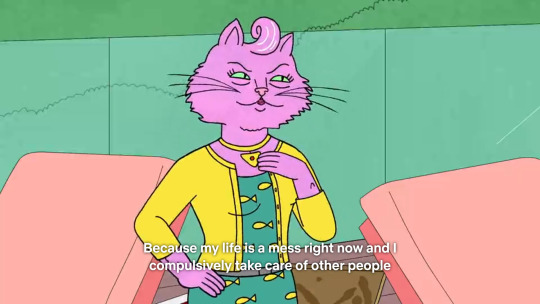
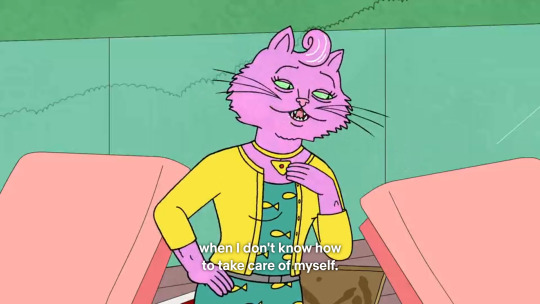
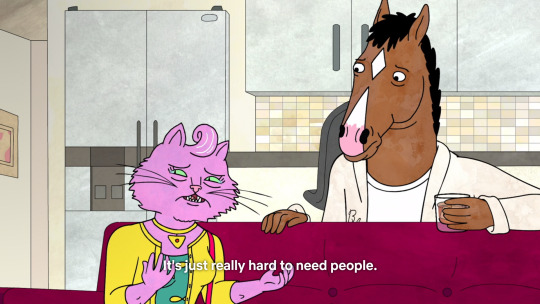
Now, all of those are interesting character flaws and serve to make her more sympathetic rather than less. That is, as long as she herself is the victim of them. But when an innocent child is dragged into it I can no longer sympathise. No matter what the personal demons you’re struggling with, when you take on the responsibility of raising a child you should do your best to put them aside. That’s the time to think about what’s best for the child, not about what you want out of it. To just brush of Ralph because “she’s made her plans” and he’s “not in them” is such a shallow reason to rob the child of the chance to have a father in its life. What, she’s going to take care of it when a lot of the time she’s already too busy to pay any attention to her personal life? Or is she waiting for someone better than Ralph to come along?
I probably wouldn’t make such a fuss out of this if the framing wasn’t so horrible. I hoped I wasn’t imagining it at first. That’s when I saw a certain popular youtuber claim that it was clear she was going to handle single motherhood just fine. That’s just such a baffling thing to say, I don’t know where to start. Okay, I have huge respect for women who are thrust into single motherhood and rise to the occasion, making the best of a difficult situation. To willingly foist that upon your little family when there’s an easy alternative is not a sign of “self-sufficiency” however, but of sheer stupidity, ignorance, narcissism, or all of the above. Furthermore, PC’s problem has never been a lack of self-sufficiency. Quite the opposite in fact. Self-sufficiency is her drug. It’s what she uses to plaster over her other problems. So is taking care of others. Which brings us to the last point: I really doubt PC is doing this for the right reasons. With her compulsion chances are she’s taken on this responsibility to solve her own problems. That’s not how this works though. Couple that with the fact that she’s got plenty to do already, and I can’t see this turn into anything but a huge disaster.
I don’t know if the showrunners are smart or honest enough to see the problems that should arise from this. I think they are, they’ve planted hints to that effect throughout season 5, but I’m not sure. Abandoning their female empowerment trip of late will certainly displease a few people. Showing the worst case scenario will be ugly and uncomfortable. Let’s hope the writing staff shows the same kind of bravery with that as they’ve done with showing Bojack’s debacles.
Conclusion
Well, if I think about it for a while I can undoubtedly find a lot more things to bitch about, but I think this will do. All in all I certainly can’t say I hate season 5, or that it was a bad season, but it was a huge step down. The main problems are that the characters just don’t progress naturally, or that their arcs are thin to the point of being almost non-existent. Not that everything that is there is bad, but it just doesn’t feel like enough to fill a whole season. It started out promising, but somewhere along the way the decision was taken to focus more on sending a political message than on where the character’s current journeys would take them and that was really to its detriment. All of the issues I mentioned in this piece could be fixed in season 6, in which case season 5 would become just a slightly too long buildup in hindsight. I do think the team behind Bojack has proven they have more than enough talent to bring this around. However, if Game of Thrones taught us anything it’s that no matter how good a show is in its first few seasons, it can always turn to shit later. Let’s hope Bojack Horseman is spared that fate.
7 notes
·
View notes
Text
Nabokov: Lively Objects
Nabokov’s lively objects After a time Nabokov’s supercilious tone wearied me and in the later novels, especially Ada the tone is pretty egotistical. The early novels, though, are marked by a quirky stylistic trope of animated objects which Nabokov used intriguingly in order to confront the reader’s experience of literary metaphor. Essentially, Nabokov pursues an original, highly individualistic, phenomenology of objects that makes the reader re-vision the world as a result of this defamiliarization.
In Nabokov’s first novel, Mary, this characteristic is not much in evidence, but in the majority of Nabokov’s novels up to The Gift (in which it reaches its apogee, a novel itself much centred on a number of questions of style and language) and The real Life of Sebastian Knight, and in the short stories of this period, destabilizing objects is a regular concern. Nabokov’s essay ‘Man and Things’ (1928) sets out his thinking on this topic. In it he takes a kind of Berkeleyan viewpoint in which it is not the object itself that exists for the viewer but only what our perception makes of it. ‘A thing, a thing made by someone, does not exist in itself’ (69) he states, but is ‘dependent upon who looks on it’. Things thus ‘bring to mind’ images which are the material of thought, of representation (he regularly criticized James Joyce for his over-estimation of the verbal-linguistic in the constitution of human thought or experience). Nabokov sees us as ‘lending things our feelings’ – which he calls ‘anthropomorphic ardour’ (72). He even goes as far to argue that things die when we ‘neglect’ them, and we often mourn them when we have done so (73).
In Invitation to a Beheading the central character Cincinnatus is shown to be surrounded by a ‘false logic of things’, chimera, objects that are animated by others, by the agents of the state who are working to subjectify him. In his experience we see him feeling a ‘general instability, …a certain flaw in all visible matter’, even if the ‘objects still observed an outward propriety’ (172). In this Orwellian and Kafkaesque world there is a moral concern to address the political status of objects and to confront the issue of who or what is doing the primary seeing and defining along with the phenomenological status of everyday objects.
This concern is also prominent is many of the interviews and essays Nabokov made concerned with questions of his style. In his fragment-essays ‘The creative writer’ and ‘style’ (both circa. 1941) he shows a concern to ‘dislocate the given world’ (189), to make the reader see the ‘whatness of things’ (187), to ‘move objects from their usual series’ (198), and to bring things out of the domain of habitual modes of experience (188) (in this he shows an affinity for Proust). This concern is particularly marked in Look at the Harlequins with its performative ‘look’ in its title and where the aim is ‘to make iniquity absurd’ (197).
But Nabokov consciously rejected the type of politically-committed literature of writers like Sartre and Camus, the Soviet novelist-ideologues of the Stalinist era such as Sholokhov, or even novelists like Pasternak who were critical of the regime. Mostly, when objects crop up in his novels they do so apolitically, defamiliarizing, to ‘reveal the most elementary things in their unique lustre’ (Think, Write, Speak 132). The aim is to redefine domestic objects in their particularity, to give them a kind of agency, like the mirror ‘that had plenty of work to do’ in Laughter in the Dark (37). In Despair, Nabokov’s Doestoyevskian novel about a Hermann Hermann and his double, Hermann laments the ‘sick mirror’ he has created of himself, the mirror representing an outside, perhaps narcissistic, view of himself that he has fallen for when he stumbles on his double. Hermann believes that having a double might allow him to escape the confines of the self he has created, that by killing his live reflection he can achieve freedom, to re-imagine himself. Hermann has an ‘eye to eye monologue’ with his double, but he is put into a critical light when Nabokov shows that in seeing just the outside of things, people as much and as like objects, Hermann is on a faltering path of redundant defamiliarization:
I cannot recollect now if the ‘monologue’ was a slip or a joke. The thing is typed out on good, eggshell blue notepaper with a frigate for watermark: but it is now sadly creased and soiled at the corners; vague imprints of his fingers, perhaps. Thus it would seem that I were the receiver – not the sender. (45)
Hermann is attempting to create a world of dead things that lack their own animation. It is also, in writing, what Nabokov sees as going on in the ‘cooperatives of words’ in tired metaphors or, historically, the way objects from earlier periods become obsolescent because the generation that animated them has dissipated (338).
The Gift serves as the apogee of Nabokov’s concern with reanimating things. In fact, the ‘Gift’ in the novel is the ability ‘to go beyond the surface of things’ (326). This is contrasted to the positivist scientific idea of objects, be they human, social or natural. In this novel Nabokov directly criticises cold German systematizing philosophical materialists like Feuerbach and Hegel. Fyodor, the protagonist artist sees ‘things like words as [having] their cases’ but commonly-understood dictionary-syntactical confinement of meaning ‘must be displaced’ (236-7) by a poetical imagination built upon ‘chance and emotion’ (198).
At one point around half-way through the novel, there is a sudden shift in the syntax and style (approximately 173 of the Penguin edition) when Nabokov’s metaphors and his characterization of objects becomes somewhat tired, predictable, conventional – a blond woman is described woodenly as ‘buxom’ and ‘whose soul was more like that of a replica of her apartment’ (186). A little further on, Herzen (whom Nabokov associates with Russian revolutionary materialists) is described as a writer producing ‘false glib glitter’ (198). And the café in which Fyodor meets Zina is described in a kind of dead prose as ‘an empty little café where the counter was painted in indigo colour and where dark blue gnomelike (the dull imprecise simile here underlined by merging with its marker – ‘like’) lamps…’. Such prose contrasts with the earlier part of the novel in which a sustained defamiliarization of the object world is evident. In particular, Nabokov sees natural phenomena, such as ‘the bent shadow of a poplar sitting there’ (51); a ‘young chestnut tree [is] unable to walk alone’ (57) and ‘dun birches…stood around blankly with all their attention turned inside themselves’. This latter instance continues to note ‘a little man was tossing a stick into the water at the request of his dog’ (45); and rain ‘loses the ability to make any sound’ (75).
Early on in Despair Hermann Hermann recounts the walk he took that led him to meet his doppelganger, Felix:
I trod upon soft sticky soil: dandelions trembled in the wind and a shoe with a hole in it was basking in the sunshine under a fence. (3)
The reader is struck by this shoe, abandoned, an object which has lost its pair and its ‘use-value’ but is still seen as being alive, animated by the verb ‘basking’. The reader is, simultaneously, aware of the subtle contrast in the metaphoric language by the more conventional attribution of ‘trembling’ to a plant like a dandelion eddying in the breeze. This is juxtaposition in Nabokov’s earlier work of conventional and animated metaphors is a regular one. It is Nabokov’s way of disturbing the reader’s literary sensibilities, to make them experience the ‘Gift’ of undermining cliched writing passing itself off as literature. In The Real Life of Sebastian Knight this occurs regularly, thus we find ‘letters resent being unfolded’ (34), the author is described as ‘budding’ (46). Bookshelves are ‘densely peopled’ which seems conventional, in contrast to the following sentence in which a writing desk ‘looked sullen and distant’ (30). A reflection is seen, commonly, as ‘live’ but is quickly followed with the attribution of a window as being ‘sick’ (51)
That shoe basking and yet useless in the human world seems to be part-way back to returning to nature, which means in Nabokov’s world to have lost its conventional meaning, that it can now only appeal to us to re-view it, reexperience its thingliness before it is lost to us. The idea of ‘thingliness’ reminds me of Derrida’s articles on Van Gogh’s boots and what Heidegger made of them in his ‘Origin of the work of Art’. Derrida, like Nabokov, was concerned with how Van Gogh’s boots were non-functioning, and, as the shoe in Despair is subject to the novelist’s revisioning, revivifying, so in Van Gogh the boots become reviewed, become the (a) ‘subject’ in painting (301). Derrida partly is concerned with literary comparisons to the painterly, suggesting that Van Gogh’s boots have a figurative value comparable to metonymy or synecdoche (302). But his main concern is how things are ‘brought into the nameable’ (306) in painting, literature, in the artistic generation of cultural value.
Things like boots become nameable when they are disturbed from their (back)ground, related in the Aristotelian concept of an originary state hypokeimenon (305). In paintings like Van Gogh’s boots this revisioning process occurs or, in literature like Nabokov’s there is a detaching and estrangement of the objects of the natural world or shoes and other domestic(ated) objects. Nabokov’s Gift, like Van Gogh’s, is to bring objects out of their expected gaze, their ground, and into revision-ing. Derrida categorizes this more generally as disturbing objects’ ‘substantia’: the thing no longer has the figure or value of ‘an underneath’ (308). Nabokov’s early novels thus sensitize us to the presence of things, to reexperience them by the activating light of his literary imagination.
0 notes
Note
I never said that I was the best person here, in fact your answer tries to see that you are the best person because you can understand and sympathize with all the people apparently. you are right to compare the situation of storm trooper with kylo is impossible, because unlike kylo, the storm trooper knows nothing different, they think that what they do is the right thing to do, because it is the way they have trained them all their lives, unlike kylo who had the opportunity to see both sides,
“who had two parents who actually fought on the opposite side of the story, but decided to change sides because he felt lonely, unloved, betrayed, his actions were based on his personal feelings, and all his old colleagues, his family and millions of people suffered for that, he could have got his revenge by killing his uncle, but instead decided to join a side that destroyed the life of a whole galaxy , what defines you is not the pain that you have experienced but what you decide to be after”
“holding this belief doesn’t make you morally superior”/= “my opposite belief is the true morally superior one”
again, you’re making an intellectually dishonest argument here and attributing beliefs to me that I never voiced and do not hold. I never said I was morally superior for being able to sympathize with the past lives of people who do evil, what I said was YOU are not morally superior because you have this odd ranking of abuse that pits the trauma of two people aganist each other for the purposes of making it seem like one is more worthy of sympathy than the other. You did that and I challenged that Idea, I never made any assertions of my own moral standing in this debate.
It an easily be argued that if Finn can break away from his conditioning and was able to tell right from wrong then why can’t the rest of the storm troopers break way despite going through the same thing he did? I don’t personally think like this but I’ve seen people who tackle the idea that stromtroopers are human beings who maybe don’t deserve to be blown to pieces by the resistance with this logic and I don’t think there is a flaw in the question even if I don’t personally agree with the line of reasoning. I think it opens the question of what is truly righteousness in the Star Wars Universe and disrupts the idea the just being aligned with the “light” makes you inherently righteous and being aligned with the dark makes her inherently unrighteous. I’m sorta off topic now but my basic point is, one again I feel like this weird moral line is being drawn and making so many things super black and white when it’s absolutely not.
you say Kylo knew the right way because he had his parents for example and just turned away as if it was actually easy for him and something he did with zero outside influence or attempts to resist. This is what I mean when I say people dismiss Kylo’s trauma because it doesn’t mirror the way other more redeemable people handled their trauma. According to Leia Snoke had been targeting Kylo from infancy and yet Kylo didn’t completely fall until he was a teenager. That means Kylo had to fight off Snoke’s tormenting emotional abuse for YEARS before finally giving into it. He didn’t just wake up one day and say “fuck my family I want the darkside”. He struggled with his upbringing in the light and the manipulative voice in his head telling him the complete opposite for all of his most crucial developmental years. Kylo was with Luke for over 5 years I think before he destroyed the temple and killed his fellow students. That’s 5 years of learning the jedi way and resisting the darkness that was building inside of him. There are people who grew up with loving perfect parents and still end up a hot all emotional mess because something parenting and your environment cant compensate for the messed up shit going on in your head and in Kylo’s case the messed up shit was Snoke who preyed on all of his most negative feelings and impulses.
You say that Kylo’s actions are motivated by his personal feelings like that’s now how most human beings are naturally wired. Most of our actions are motivated my our personal feelings. It only takes on look on tumblr to see how much loneliness, betrayal, feeling unloved, etc motives people to so and say things and effects the way they develop into adulthood and beyond. THAT’s exactly why understanding Kylo and having his character in existence is such a good thing to so many people, it actually explores the nuance to human behavior and psychology instead of sticking to this false black and white dichotomy fiction likes to force feed us. Sure Kylo decided to deal with his issues in a very destructive, unhealthy, and at times unnecessary ways no one is denying that and you aren’t obligated to accept that but ultimately I’ve never asserted that you had to accept it so I’m not sure what else you want from me on this particular subject. You’re also conveniently moving the goal posts of your original l argument which that you can’t understand murder, now you say kylo should have just targeted Luke for murder instead of everyone else as well and that’s just what’s unacceptable to you.
The quote about how pain doesn’t define you but what you decide to be after does is nice and inspirational in theory and might be perfectly applicable to emotionally healthy people. I hate to break it to you but for some people, for a good portion of their lives their pain DOES define them, it defines them in very profound ways until they find a way to break away from it and cope with it in a healthy way. Some people never do, some people do after a long process.The decision of what you want to be after pain isn’t always that easy when it has been such a large part of your life for so long. Does that mean that a person who takes a little while longer than other to disassociate from their pain and does some pretty terrible things during that time doesn’t deserve any sympathy or compassion ever because they made the “choice’ to let their pain define them? . People can feel however they want about Kylo but it’s canon that he has been torn apart and conflicted for a long time now, hell part of the reason he killed Han was because he was foolishly convinced that killng his father would put an end to the conflict that has been within him for as long and his can remember and end his pain, he learned the hard way that his ideas was misguided but not before he did something terrible that he can not take back no matter how much he regrets it. We don’t have the end of Kylo’s story yet so we don’t know if his ultimate fate is to continue to let his pain define him and continue his path, however there are some people who chose to be hopeful and see that in many ways Kylo does deserve sympathy and can disassociate from his pain eventually. You can chose not to but as I said before, it doesn’t make you “right” or superior here which is what most people who go on and on about these things feel about their beliefs.
4 notes
·
View notes
Text
Feminism in Middle Earth
In The Fellowship of the Ring, Author J.R.R. Tolkien idealizes women by portraying them as prefect Victorian females, who are beautiful and flawless, thus inhibiting them from being strong characters.
The absence of major female roles in J.R.R. Tolkien’s The Fellowship of the Ring has caused Toklien’s novel to be the subject of debate by feminist critics. This criticism is because Tolkien’s novel is primarily concerned with male-male relationships: that is the friendship of Frodo and Sam, Legolas and Gimli, the power dynamic of Aragorn and Boromir, and the father son relationship of Denethor and Faramir (Campbell, 56). While the male relationships and characters are strongly developed, Tolkien does not depict any strong female characters to play leading roles in the development of the story. There are only three female characters in total compared to the 38 male characters that are developed in the novel. In fact, the word “she” only appears 146 times in the 571 pages, where the word “he” is used 14,763 times. While there is no disputing the gender inequality of Tolkien’s characters, it should be noted that of the female characters he creates, he writes of them quite fondly.
Accepting the notion that Tolkien writes unequally about men and women, one must remember that he was a child of the Victorian era in Great Britain, and as such was likely influenced by Victorian views of the women’s role in British Society at that time: subservient and disadvantaged, existing merely to support the males of the era (Drout, 204). Though there are not a lot of references to Tolkien speaking of women, his few remarks prove clearly that he believed women should assume traditional gender roles. Specifically, in one of his letters he mentions feminism to be one of the “evils” inherent to the American influence on the world (letter 43, Carpenter1995). Similarly, in one of his letters to C.S. Lewis concerning the case of the woman registrar, Tolkien displays skepticism of women holding positions of responsibility (letter 49, Carpenter 1995). In a letter to his son Michael he wrote that a women's "gift is to be receptive, stimulated, fertilized (in many other matters than the physical) by the male" (letter 43, Carpenter 1995). As a result, Tolkien, in his novel, creates a world that preserves a patriarchal society where women keep stereotypical Edwardian and Victorian roles, rather than creating strong, leading, female characters (Madill).
In literature, a strong female character can be seen as having these characteristics: she does not exist to support another character, she is flawed, she captures our attention, she changes over the course of the story, and she has the ability to stand up to the antagonist (Patterson). None of the female characters in The Fellowship of the Ring have any of these attributes. Rather, Tolkien’s women assume characteristics opposite from those of a strong female character, and are described the ideal Victorian woman. The ideal Victorian woman “at this time was not the weak, passive creature of romantic fiction. Rather she was a busy, able and upright figure who drew strength from her moral superiority and whose virtue was manifested in the service of others” (Abrams). Galadriel, Arwen, and Goldberry lean in the opposite direction of strong females. Instead, they mirror the ideal Victorian woman because they exist only to support the men on their journey. They are flawless. The only attention they capture is with their beauty. They do not develop throughout the novel and they take minor roles that do not require them to stand up to an antagonist.
While a strong female character does not exist to support another character, Tolkien’s females exist solely for the purpose of aiding the fellowship on their journey. Goldberry exists primarily as Tom Bombadil’s companion. She keeps his house and hosts Frodo and the Hobbits when Tom is not around. Other than acting as a nurturer to the fellowship, giving them food, water, and a place to rest, Goldberry doesn’t serve a purpose in the novel.
Galadriel is a partner for Celeborn and is described in likeness to him. They “side by side, Celeborn and Galadriel. They stood up to greet their guests… Very tall they were, and the Lady no less than the Lord; and they were grave and beautiful” (Tolkien, 461). Together “they” are illustrated to compliment each other, rather than combat one another. However, even though Galadriel is portrayed as equal to a man her purpose is still the same as the other women: to help the fellowship. She becomes somewhat of a spiritual guide to Frodo, letting him know that his “Quest stands upon the edge of a knife. Stray but a little and it will fail, to the ruin of all” (Tolkien, 464). She reiterates the importance of Frodo’s quest and also helps him realize his own strength and so aids him in his journey but Tolkien does not give Galadriel any of her own strong characteristics nor does she play a leading role in the development of the story.
Tolkien idealizes the women in The Fellowship of the Ring by portraying them without character or external flaws. The women are all beautiful and act in the way that he thinks Victorian women should. Arwen for example, is described as being so lovely that Frodo had “never seen nor imagined” such a thing so beautiful (Tolkien, 295). Frodo is even surprised to be seated among a person “so high and fair” (Tolkien, 296). Likewise, Goldberry is “light” and “merry,” only concerned with being a good host to the Fellowship and making sure their needs are met. She is “small and slender like a sunlit flower” and watches over the men until she is no longer able. Galadriel is associated with the color white which indicates purity and flawlessness. She is seen “clad wholly in white,” and described as “tall and white and fair” (Tolkien, 461, 474). Tolkien’s complete idealization of his female characters makes them less believable as characters, instead they are these angelic, “white,” seemingly untouchable beings that are almost too perfect to be true.
What makes the men in the novel so compelling is that they are flawed and show struggle like humans. Boromir’s greed allows him to assault Frodo in conquest for the ring. Frodo is true of heart, but he even is overcome by the power of the ring at points showing that even the best man can be corrupted. The women however do not show any of these flawed characteristics. Arwen is reserved and speaks only when needed. She shows this when Frodo and Arwen spoke together, “the light of her eyes fell upon him from afar and pierced his heart. He stood still enchanted, while the sweet syllables of the Elvish song fell like clear jewels of blended word and melody” (Tolkien, 310). She does not need to use verbal communication, but rather can project what she feels.
Goldberry is extremely domestic as the proper Victorian women were supposed to act. She listens to her husband and takes perfect care of her guests. However, when Frodo and the Hobbits stay with Tom and Goldberry, they observe that the two of them together “weave a single dance, neither hindering the other, in and out of the room, and round about the table” (Tolkien, 172). Moving as perfect compliments to each other, Tolkien uses Tom and Goldberry to show the ideal relationship, where neither partner seeks control or possession of each other. They are harmonious because of their togetherness. While Goldberry’s identity is nothing without Tom, she compliments Tom in a perfect way making them both better because of their harmony.
Galadriel’s purity comes from her beauty and intelligence. “There is in her no evil, unless a man bring it hither himself” (Tolkien, 466) showing that men are the ones who make and take away from women’s perfection. Galadriel, like Arwen is not vocal but rather, “spoke no word, but beckoned to them” (Tolkien, 470). Her perfection shows again in that she is unimaginably old but shows her age only through “the deep wells of memory” (Tolkien, 461). Arwen, Goldberry, and Galadriel are perfect to a point where their perfectness begins to take away from their realness. Without any flaws these women are ornamental, and serve to add something pretty and nice in the novel, rather than drive any plot or action further.
Subsequently, instead of capturing attention through well developed and compelling character traits, the women in Tolkien’s novel capture the men’s attention by their beauty, the way a Victorian woman would. Tolkien goes into the most depth when describing the appearance of his women. He rarely writes about their minds or about their character, but when he describes how his women look he goes into great detail. For example, the longest and most significant passage regarding Arwen reflects the way she looked at the table the first time the fellowship meets her.
There sat a lady fair to look upon, and so like was she in form of womanhood to Elrond that Frodo guessed that she was one of his close kindred. Young she was and yet not so. The braids of her dark hair were touched by no frost; her white arms and clear face were flawless and smooth, and the light of stars was in her bright eyes, grey as a cloudless night; yet queenly she looked, and thought and knowledge were in her glance, as of one who has known many things that the years bring. Above her brow her head was covered with a cap of silver lace netted with small gems, glittering white; but her soft grey raiment had no ornament save a girdle of leaves wrought in silver (Tolkien, 295-6)
In the passage above, Tolkien never speaks how she interacts with the men at the table, or why she is at a table of all men, or makes her qualified to be seated among these noble men. Rather, he describes her like a decoration that would be at the table, which is “flawless and smooth,” that was “covered with a cap of silver lace netted with small gems, glittering white” (Tolkien, 296). The men are entranced by her “ornament”, not her strength of heart or compassion.
Similarly, Goldberry’s longest and most significant passage goes into great detail regarding her looks.
In a chair, at the far side of the room facing the outer door, sat a woman. Her long yellow hair rippled down her shoulders; her gown was green, green as young reeds, shot with silver like beads of dew; and her belt was of gold, shaped like a chain of flag-lilies set with the pale-blue eyes of forgetme-nots. About her feet in wide vessels of green and brown earthenware, white water-lilies were floating, so that she seemed to be enthroned in the midst of a pool.( Tolkien, 161)
Again, Goldbery, like Arwen is described like a decoration that would be at the table. She is likened to the flowers that could sit at the center of a table, “set with the pale-blue eyes of forgetme-nots” (Tolkien, 161). That is, she is seated at a table alluding to a sense that a woman’s place is in the home, thus domesticated, like a Victorian woman should be and not what literature would characterize as a strong female character.
While strong characters change over the course of the story, Tolkien’s women do not change. This could be attributed to the fact that the women in The Fellowship of the Ring are not reoccurring characters. Arwen, Goldberry, and Galadriel only make brief appearances along the way of the fellowships journey. In order for the women to show change they would need to be present longer. However, the three women in the novel do show consistency in the way the men in the novel talk and regard the women. The men hold the women of the novel in high regard and often see them as above the men. The hobbits especially speak highly of the women in the novel. Frodo frequently calls Arwen and Goldberry, “my fair lady” ( Tolkien, 311, 162). He speaks of Arwen as “so high and fair” that he was surprised to be seated among her (296). Lady Galadriel is said to be “above all the jewels that lie beneath the earth” (Tolkien, 464). Frodo even offers to give Galadriel the Ring. “You are wise and fearless and fair, Lady Galadriel,” said Frodo. “I will give you the One Ring, if you ask for it. It is too great a matter for me” (Tolkien, 475). The fact that Frodo would willingly give up the ring to Galadriel shows just how highly he regards her.
Lastly the women do not have a chance to stand up against a protagonist because the roles of the women are just features in the novel. The women do not follow the men on their journey and thus have no chance to stand up to the antagonists in the story. Arwen, Golderry, and Galadriel are instead domestic beings that as a result do not travel with the men on their journey. Thus they do not have the chance to be heroes, or as Tolkien may see it, to be put in danger. Tolkien seems to do this on purpose.
Tolkien does not have any leading roles for Women in Fellowship. He uses women as purely supporting cast for the story that is dominated by men and the male-like creatures of Middle Earth. He is a male himself and was raised in an era where women simply did not play any type of leading role in society. As such, there is a scarcity of female characters throughout the story and when they do appear, it is only briefly and they only exist as perfect specimens that are added only in support of the male characters that drive the story.
-CS
Works Cited :
Abrams, Lynn. "Ideals of Womanhood in Victorian Britain." BBC News. BBC, 8 Sept. 2001. Web. 11 Nov. 2015.
Campbell, Lori M. A Quest of Her Own: Essays on the Female Hero in Modern Fantasy. Jefferson, North Carolina: McFarland, 2014. Print.
Challis, Erica ("Tehanu"), 2003, 'Quests, Myths and Heroines', in The OneRing.net (eds.), 2003, The People's Guide to J.R.R. Tolkien, Cold Spring Harbor: Cold Spring Press, pp. 136-142.
Carpenter, Humphrey (ed.), 1995b, The Letters of J.R.R Tolkien. London: Harper Collins. [letters]
Drout, Michael D. C. "Feminist Readings of Tolkien." J.R.R. Tolkien Encyclopedia: Scholarship and Critical Assessment. New York: Routledge, 2007. 202-06. Print.
Madill, Leanna. "Gendered Identities Explored: The Lord of the Rings as a Text of Alternative Ways of Being." The Alan Review Winter 2008 35.2 (2008): n. pag. Virginia Tech Library. Web. 11 Nov. 2015. <https://scholar.lib.vt.edu/ejournals/ALAN/v35n2/madill.html>.
Patterson, Amanda. “The Six Defining Characteristic of a Strong Female Character.” Web log post. WritersWrite. Posthaven, 24 Mar. 2014. Web. 9 Nov. 2015.
The Lord of the Rings. Dir. Tolkien, J. R. R. Houghton Mifflin, 1967.
Women among the Inklings: Gender, C.S. Lewis, J.R.R. Tolkien, and Charles Williams. 191 Vol. Westport, Conn.: Greenwood Press, 2001. Contributions in Women's Studies Web.
3 notes
·
View notes
Text
Schindler
a reflection paper on Schindler’s List
by Marie Uy
August 06, 2013
Life is precious. Life is priceless. But in times of war, its value becomes meaningless. Only death is assured. Life is at risk. There are no exceptions, but there could be hope. In the 1993 epic film about Holocaust, Schindler’s List, it was hope that the Jews alive. And that hope was given to them by a Nazi-Czech entrepreneur Oskar Schindler (Liam Neeson).
The movie started with candles and Sabbath, the holy day for Jews. As the film opens, the Sabbath ceremony finishes and fades gradually. I think this denotes the death of the Jews and the burning of the candles as the end of their lives. The movie starts with a train being shown and the Jews registering their names. As the movie progresses, it shows a man in preparing for an occasion, and that is Schindler. Then the scene shows how he had his connections with the high ranking officials of the Nazis – by giving gifts and treats, and bribing. Then he had his photos taken with them as he had fun with them. This only shows how to “befriend” those in the upper circle – bribe them, oh, those corrupt people. And then, the next scene was all about how Schindler had his accountant Itzhak Stern (Ben Kingsley) from Judenrat (the Jewish Council), to administer his enamelware factory. With Stern’s help, he then had his connections with some black marketers. He had them invest on his factory in exchange for his pots and cans, and had Stern find Jews to work for him – he wanted Jews because of their cheap labor. Schindler was such an opportunist back here, as he only cares for the money, not the workers.
Stern used that opportunity to get more Jews, and to be able to save them. Schindler was really grateful to Stern as his factory was successful. To Schindler, he only thought of the Jews as his “money-makers”, as what he told his wife. But as time passed by, he became more aware of what the Nazis were really doing and therefore, became involved in saving them. As he and his mistress watch the liquidation of the Jews in Krakow from a hill, he was moved and his conscience struck him. From then on, he befriended Amon Goeth (Ralph Fiennes), the Commandant sent from Berlin to Krakow. He influenced him in some ways like as to how to view power. By the end of the war, Schindler was able to save one thousand and one hundred Jews.
Many of my friends back in high school have already watched and recommended me this film, but it was my first time to watch this film–during our class. Technically speaking, the production and techniques used in making this film was really great. It is really a Spielberg work. Emotionally speaking, this film really moved me. I am so grateful that I am not born during those times. I really felt sad for the Jews that were the victims of the Holocaust. In fact, if ever I was born during those times and was rich as Schindler, I would do the same thing as to what Schindler did.
The inhumane actions of the Nazis were like the works of the demons. They should not consider themselves humans; for to be a human, one must act humane and civilized. What they did is just exactly the opposite. Their actions and way of killing was really brutal. Compared to the Samurais of Japan, their level of villainy surpasses the measure of villainy. Why? Samurais only kill because of the order of their lords, for the protection of whoever they are serving. But the Nazis, they killed Jews and some people who are not even Jews, just as long as they had the urge to kill a person. During their invasion in the Philippines, they killed Filipinos but were not as harsh as how the Nazis killed the Jews. The major victims here during the Death March were of course, the soldiers and those others who chose to fight alongside. About the Nazis, everyone that is a Jew was to die. To think that both situations were at the state of war, what the Nazis did was way too much. They were ruthless, heartless, inhumane creatures.
As I re-watched the film, there was this idea that confused me “that Schindler is a Nazi and he is helping the Jews”. But as I reflected, sympathy and being humane does not rely basically on one’s race or religion rather on one’s thinking and heart. This movie was based on a true story, Oskar Schindler’s story. He was a great example of having a change of heart. At first, he is introduced as a greedy businessman who benefited from slave-labor. But after he had seen and realized that his workers’ and all the Jews’ fate were bound to death by the Nazis, he had the urge to save them. After watching this film, I admired him despite of his flaws, such as that being a womanizer. Everyone has a chance to change; even a very sinful man may become a hero.
What Schindler said to his wife Emilie (Caroline Goodall) is really inspiring: “’Oskar Schindler,’ they’ll say, ‘everybody remembers him. He did something extraordinary. He did something no one else did…” He was really someone to be remembered. His greediness-turned -kindness attitude was really amazing. Saving one thousand and one hundred people from death was a great achievement – even after he died. One life can do great things; but one thousand and one hundred lives can do greater things. I remember the Talmudic quotation that was engraved in the ring that was given to him by the Jews, it says: “He, who saves the life of one man, saves the world entire.” For me, he was both a hero and anti-hero. For the Jews, he was their savior.
The societal problems I noticed in the film were discrimination – of all kinds (race, religion, physical attributes, etc.), and corruption – in the form of bribery. In my opinion, the world is really consumed by materialistic thoughts – of money and riches. Those things were the “realistic” measure of power. Yes, I also believe that control is power and that forgiving shows it, like what Schindler have said to Amon. But in the world we live in, money makes the world go round. You cannot have nor do anything without money. That is the true measure of power nowadays, as well as before. How? With Schindler’s money and properties, he was able to save those Jews. That is power. Money gives someone fame, influence, power – everything. Let us say, for example, that Schindler is a German that is pro-Jews but is not very rich. Do you think he would be able to save that number of Jews? Of course not! Yes, he might be able to save a few but that could cost him everything.
Schindler’s List was greatly made by the production and it has an extraordinary story to tell. It is another standing ovation for Spielberg. His technique of using black and white was much effective in stressing the emotions to the audience. Having that little girl in red cloak was also one good technique in showing Schindler’s change of heart. Indeed, this movie is a must-watch movie for everyone with mature thinking, for this movie has scenes unsuitable for young audiences. I think this movie was able to touch and affect most of those who have watched it basically because this movie has a heart – heart that reaches to the audience and says about the horrifying acts of the Nazis to the Jews, and how one Nazi have changed ways and saved the Jews instead.
The film Schindler’s List is really one of the greatest movies of all times! It lets one have a quick view on what happened back in the human history. It lets one contemplate about the essence of life, the society, and the morals and values we should have as humans. Schindler’s List has shown how one man of great power can influence, inspire, and give hope to others. The movie has shown that one man can make a difference in the midst of evil. Someday, I want to be someone somewhere, like Oskar Schindler – to be the light despite the darkness everywhere.
0 notes